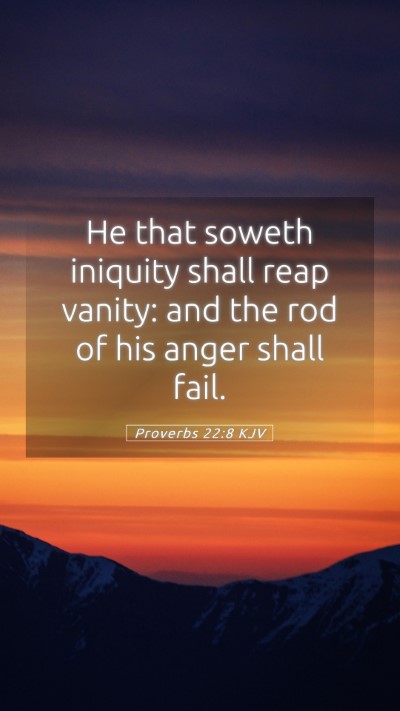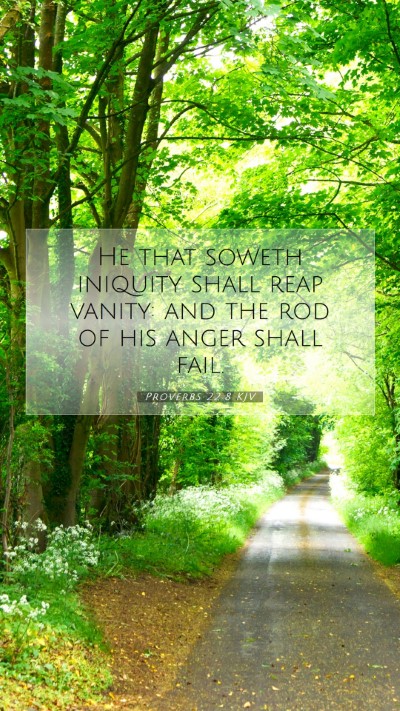Understanding Proverbs 22:8
Proverbs 22:8 states, "He who sows injustice will reap calamity, and the rod of his fury will perish." This verse presents a profound biblical principle regarding the consequences of our actions, particularly in terms of unjust behavior.
Meaning of the Verse
This biblical verse emphasizes the law of cause and effect in moral behavior. The phrase "sows injustice" can be understood as engaging in actions that are unfair or wrong. As Matthew Henry explains, the metaphor of sowing implies that something is being planted, which will eventually yield a harvest.
Biblical Exegesis
Albert Barnes comments that the term "calamity" signifies the suffering and destruction that inevitably follows wrongdoing. This brings forth the idea that just as a farmer reaps what he sows, individuals will face the repercussions of their unethical decisions. Adam Clarke further elaborates on the concept of reaping calamity, suggesting that the phrase encapsulates both immediate and long-term consequences that result from unjust actions.
Scripture Analysis
When analyzing this verse, it is crucial to consider its historical context. During the time Proverbs was written, social justice was a vital aspect of community living. Leaders and individuals alike were held to high ethical standards, as injustices could lead to societal breakdown.
Application of the Verse
Understanding Proverbs 22:8 can have significant implications for today's readers. It calls for a reflection on one’s own actions and decisions, urging individuals to act justly and fairly. In a practical sense, this encourages adherence to ethical behavior in personal and professional relationships, as the consequences of injustice are surely forthcoming.
Key Insights from Commentaries
- Matthew Henry: Focuses on the certainty of reaping consequences from unjust actions.
- Adam Clarke: Highlights the concept of the 'rod of his fury' as ultimately leading to downfall.
- Albert Barnes: Emphasizes the inevitability of calamity as a result of injustice.
Related Bible Verses
This verse has several cross references that enhance its meaning:
- Galatians 6:7: "Do not be deceived: God cannot be mocked. A man reaps what he sows."
- Job 4:8: "As I have observed, those who plow evil and those who sow trouble reap it."
- Ecclesiastes 11:1-2: "Cast your bread upon the waters, for you will find it after many days. Give a portion to seven, or even to eight, for you know not what disaster may happen on earth."
Conclusion
In conclusion, Proverbs 22:8 serves as a significant reminder of the principles of justice and moral consequences within the biblical framework. By understanding this verse, individuals can gain insights into the importance of ethical living and the repercussions that come from unjust actions. This verse encourages the reader to live a life marked by fairness, integrity, and a sense of justice, reinforcing the biblical ideals of righteousness throughout Scripture.
For Further Study
Incorporating this verse into Bible study groups or online Bible study sessions can facilitate deep discussions about justice and moral responsibility. Utilizing various Bible study tools and resources can enrich the analysis and application of this verse.


